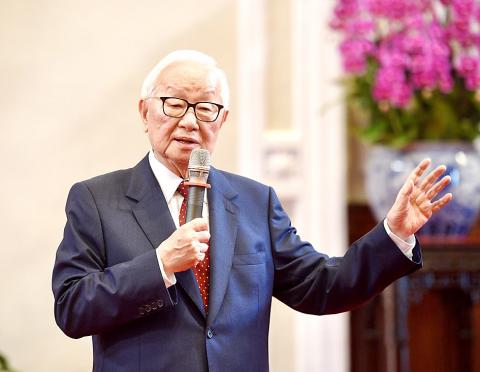President Tsai Ing-wen (蔡英文) yesterday announced that she had once again tapped Taiwan Semiconductor Manufacturing Co (TSMC, 台積電) founder Morris Chang (張忠謀) to represent her at the APEC leaders’ summit next month.
It is the second straight year that Chang is to go to the annual summit, which is to take place in Santiago, Chile, on Nov. 16 and 17.
Chang also represented Taiwan at the 2006 summit as then-president Chen Shui-bian’s (陳水扁) representative.

Photo: Peter Lo, Taipei Times
Chang, 88, is the former chairman of TSMC, the world’s largest contract chipmaker. He retired on June 5 last year after more than three decades at the company’s helm.
Tsai told a news conference at the Presidential Office Building in Taipei that she chose Chang as her representative, because of his respected status in the international arena and in-depth knowledge of the evolution and development of the nation’s technology sector.
Tsai said she has given Chang and the APEC delegation two major tasks. The first is to share Taiwan’s views on how to strengthen international economic integration in the digital era.
The president said she wants Chang to tell the gathering of the nation’s resolve and accomplishments in promoting a digital society and smart nation policies over the past few years.
The second is to make known Taiwan’s dedication to promoting inclusive and sustainable growth, and joining other economies to boost economic growth in the Asia-Pacific region in an inclusive and sustainable way, Tsai said.
APEC is celebrating its 30th anniversary this year, and the emergence of the Internet has drastically changed the economy and people’s way of life over the past three decades, Chang said.
He said he would discuss how to fully utilize the digital economy to advance people’s welfare and solve problems, as the digital economy has also caused negative social effects, such as more severe unemployment and wealth inequality.
Chang met US Vice President Mike Pence on the sidelines of last year’s APEC summit in Papua New Guinea for talks on free trade.
It was the highest-level talks between leaders from Taiwan and the US at an APEC event.
At the 2006 summit in Hanoi, Chang was greeted by then-US president George W. Bush at the summit, who said: “I know who you are.”
Taiwan joined the regional economic forum in 1991, two years after its establishment.
However, Taiwan’s president cannot attend the APEC leaders summit, due to the group’s “one China” position.

Intelligence agents have recorded 510,000 instances of “controversial information” being spread online by the Chinese Communist Party (CCP) so far this year, the National Security Bureau (NSB) said in a report yesterday, as it warned of artificial intelligence (AI) being employed to generate destabilizing misinformation. The bureau submitted a written report to the Legislative Yuan in preparation for National Security Bureau Director-General Tsai Ming-yen’s (蔡明彥) appearance before the Foreign Affairs and National Defense Committee today. The CCP has been using cognitive warfare to divide Taiwanese society by commenting on controversial issues such as Taiwan Semiconductor Manufacturing Co’s (TSMC, 台積電) investments in the

INVESTIGATION: The case is the latest instance of a DPP figure being implicated in an espionage network accused of allegedly leaking information to Chinese intelligence Democratic Progressive Party (DPP) member Ho Jen-chieh (何仁傑) was detained and held incommunicado yesterday on suspicion of spying for China during his tenure as assistant to then-minister of foreign affairs Joseph Wu (吳釗燮). The Taipei District Prosecutors’ Office said Ho was implicated during its investigation into alleged spying activities by former Presidential Office consultant Wu Shang-yu (吳尚雨). Prosecutors said there is reason to believe Ho breached the National Security Act (國家安全法) by leaking classified Ministry of Foreign Affairs information to Chinese intelligence. Following interrogation, prosecutors petitioned the Taipei District Court to detain Ho, citing concerns over potential collusion or tampering of evidence. The

‘COMPREHENSIVE PLAN’: Lin Chia-lung said that the government was ready to talk about a variety of issues, including investment in and purchases from the US The National Stabilization Fund (NSF) yesterday announced that it would step in to staunch stock market losses for the ninth time in the nation’s history. An NSF board meeting, originally scheduled for Monday next week, was moved to yesterday after stocks plummeted in the wake of US President Donald Trump’s announcement of 32 percent tariffs on Taiwan on Wednesday last week. Board members voted to support the stock market with the NT$500 billion (US$15.15 billion) fund, with injections of funds to begin as soon as today. The NSF in 2000 injected NT$120 billion to stabilize stocks, the most ever. The lowest amount it

NEGOTIATIONS: Taiwan has good relations with Washington and the outlook for the negotiations looks promising, Minister of Economic Affairs J.W. Kuo said Taiwan’s GDP growth this year is expected to decrease by 0.43 to 1.61 percentage points due to the effects of US tariffs, National Development Council (NDC) Minister Paul Liu (劉鏡清) said at a meeting of the legislature’s Economics Committee in Taipei yesterday, citing a preliminary estimate by a private research institution. Taiwan’s economy would be significantly affected by the 32 percent “reciprocal” tariffs slapped by the US, which took effect yesterday, Liu said, adding that GDP growth could fall below 3 percent and potentially even dip below 2 percent to 1.53 percent this year. The council has commissioned another institution